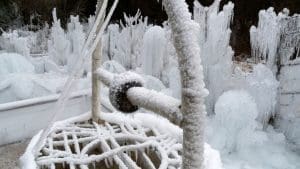Could Your Water Well Be Affected this Winter Season?
Winter weather can cause problems for homeowners. For homeowners who rely on private water wells to provide high-quality water for their families, winter may cause additional problems. Wells are designed to access groundwater that does not freeze, so most of your well components are below the freeze line. However, issues do arise, and homeowners should be prepared to watch out for possible signs of danger. Winter weather can have a significant impact on water wells, particularly in areas that experience freezing temperatures. One of the main issues that occur during the winter season is the freezing of the water in the well. As temperatures drop below freezing, the water in the well may also freeze, causing damage to the well casing, water pipes, and other components of the system. In this post, we will discuss some common well issues related to cold weather.
Frozen Pipes
Because your water well is located underground, the water in it probably won’t freeze, as the water level should be way below the frost line. However, the pump system and pipes that run your well and deliver the water to you can be very vulnerable to cold snaps if they are not buried properly underground.
Winter weather can wreak havoc on wells and plumbing systems as freezing temperatures can cause pipes to freeze and potentially burst. When water freezes, it expands, exerting tremendous pressure on the walls of the pipes, leading to cracks or ruptures. The consequences of frozen plumbing can be costly and disruptive, causing water damage to your property and requiring significant repairs.
There are several factors that contribute to frozen plumbing during winter. The most common scenario is when exposed pipes in unheated areas, such as basements, attics, crawl spaces, or outdoor pipes, are not adequately insulated. Inadequate insulation allows the cold air to penetrate the pipes, leading to freezing. Additionally, pipes that are located near exterior walls that lack proper insulation are also vulnerable to freezing.
To prevent frozen plumbing, it is essential to take proactive measures. Insulating exposed pipes with foam or pipe sleeves can help retain heat and protect against freezing. Applying heat tape or cable to vulnerable pipes can also provide an extra layer of protection. During periods of extremely cold weather, allowing a small drip of water to flow through faucets can help prevent freezing by keeping water moving.
If freezing temperatures are in the forecast, it is crucial to take precautions to prevent frozen plumbing. Keeping the thermostat set to a consistent temperature throughout the day and night can help maintain a warmer environment, especially in unheated areas. Opening cabinet doors under sinks to allow warm air to circulate around pipes and sealing any gaps or cracks in walls and windows can also prevent freezing.
Overall, winter weather can freeze plumbing and cause damaging consequences. By implementing preventive measures, such as insulation and temperature control, homeowners can protect their plumbing systems from freezing and the associated headaches and expenses.
Power Outages
If you experience a power outage due to ice or snowstorms, your water well pump will not work. You will continue to use water for a short time as your system draws the remaining water from the well storage tank. However, once that water is used, you will not have access to fresh water until power is restored. In many cases, this does not pose an immediate problem, as power outages are often short-lived.
One of the best ways to avoid losing water supply during a power outage is to install a backup generator in your home to supply power to essential appliances. The size and scope of your backup generator system will depend on how elaborate a system it needs to maintain. A smaller, gasoline-powered pump should suffice if you only need to provide power to a sump pump. However, the more fixtures and appliances you add to the load, like lights, well pump, furnace, refrigerator, etc., the larger the backup generator will be.
If you use a gasoline-powered generator, please ensure it is placed outside, not in a crawl space, basement, or attached garage. Make sure the generator is safely connected. And once power is restored, disconnect the generator immediately.
Additionally, it is a good idea to keep a backup supply of freshwater inside the home in case of an extended power outage.

Well System Issues
Cold weather can have various effects on private water well systems. As temperature levels drop, there are a few key areas that can be impacted by cold weather conditions.
There is always a tiny amount of water retained in the pipe connecting to the pressure switch in well pumps. That water is very susceptible to freezing, and once it does, it will expand, preventing the pump from turning on. If the water in the pipe freezes, use a heat source such as a hairdryer to thaw it and get it working again. To avoid freezing, wrap the pipe with insulating materials and keep the pump next to a significant heat source to keep the temperature above 32 degrees.
Cold weather can also affect the performance of the well pump. The cold temperatures can cause the water to become denser, which increases its viscosity. This can put more strain on the pump, making it work harder to draw water from the well. In extreme cases, the pump may not be able to keep up with the demand for water, resulting in low water pressure or a complete loss of water supply.
To mitigate the effects of cold weather on private water well systems, there are a few preventative measures that can be taken. Insulating the well casing and any exposed pipes can help protect against freezing. Installing a well system with proper insulation and frost-proof components can also provide added protection. Additionally, ensuring that the well pump is properly maintained, adequately sized, and in good condition can help it perform optimally in cold weather conditions. Furthermore, if your pressure tank is in a garage or mechanical that isn’t climate controlled, you’ll need to take precautions to keep the water from freezing.
If you have concerns about your water well system’s ability to withstand freezing temperatures, whether the pump and pipes are aboveground or below, give C&J Well Co. a call. We’ve been the go-to well service company in Central Indiana for over 25 years, and as a family-owned business, we plan to be for generations more. Our decades of experience make us the local experts at preventing frozen pipes and pumps and repairing any problems you encounter with your well. Contact us today!










